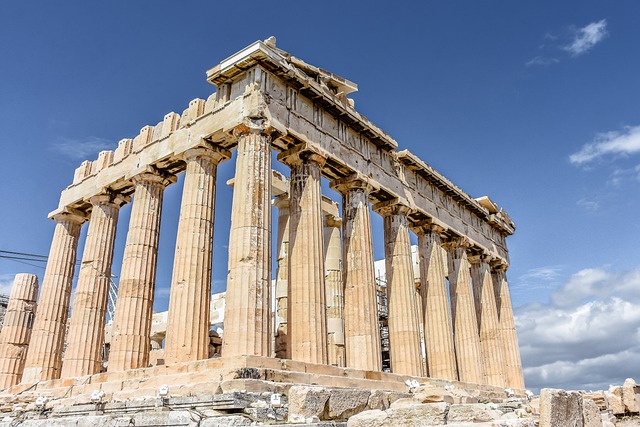As we navigate the complexities of modern life, it’s easy to feel disconnected from the wisdom of the past. Yet, the ancient Greeks offer a wealth of insight into the human experience, particularly when it comes to the practice of meditation. From the Stoics to the Epicureans, Greek philosophers explored the benefits of contemplation and introspection, seeking to understand the nature of the self and the universe. In this article, we’ll delve into the world of ancient Greek philosophy, exploring the various approaches to meditation and the enduring relevance of their teachings in our modern world.
1. “Exploring the Roots of Meditation: Greek Philosophy and the Ancients”
Meditation has been practiced for thousands of years, and its roots can be traced back to ancient Greek philosophy. The Greeks believed that the mind and body were interconnected and that a healthy mind was essential for a healthy body. They also believed that the mind could be trained and that meditation was a way to achieve this.
One of the most famous Greek philosophers, Aristotle, believed that meditation was a way to achieve a state of contemplation and self-reflection. He believed that by focusing on one’s thoughts and emotions, one could gain a deeper understanding of oneself and the world around them. Other ancient cultures, such as the Egyptians and the Hindus, also practiced forms of meditation, but it was the Greeks who first formalized the practice and developed techniques that are still used today.
- Benefits of Meditation: Meditation has been shown to reduce stress, anxiety, and depression. It can also improve focus, concentration, and overall well-being.
- Types of Meditation: There are many different types of meditation, including mindfulness meditation, loving-kindness meditation, and transcendental meditation.
- How to Meditate: To meditate, find a quiet place where you can sit comfortably. Close your eyes and focus on your breath. If your mind wanders, gently bring it back to your breath.
Overall, the roots of meditation can be traced back to ancient Greek philosophy and the belief that the mind and body are interconnected. Today, meditation is practiced all over the world and has been shown to have numerous benefits for both physical and mental health.
2. “The Art of Contemplation: How Greek Philosophers Embraced Meditation”
The ancient Greeks were known for their philosophical ideas and their love for knowledge. One of the lesser-known aspects of their philosophy is their practice of contemplation, which is similar to meditation. The Greeks believed that contemplation was essential for achieving a peaceful mind and a happy life.
Contemplation involved focusing on a particular idea or concept and thinking deeply about it. This practice was used to gain insight into the nature of reality and to understand the world around them. Greek philosophers such as Plato, Aristotle, and Epicurus all embraced contemplation as a means of achieving wisdom and enlightenment. They believed that by contemplating the world around them, they could gain a deeper understanding of themselves and their place in the universe.
3. “From Socrates to Aristotle: Tracing the Evolution of Meditation in Ancient Greece
Ancient Greece is known for its rich philosophical tradition, and meditation played a significant role in the lives of many of its most famous thinkers. From Socrates to Aristotle, the practice of meditation evolved and developed over time, reflecting the changing beliefs and values of the ancient Greeks.
One of the earliest references to meditation in ancient Greece comes from the philosopher Socrates. He believed that the practice of introspection and self-reflection was essential for personal growth and understanding. Socrates encouraged his followers to engage in regular periods of quiet contemplation, during which they could reflect on their thoughts and emotions and gain insight into their own nature. This practice of self-examination became known as the Socratic method, and it remains a popular technique for personal growth and development to this day.
As the centuries passed, the practice of meditation continued to evolve in ancient Greece. Aristotle, one of the most influential philosophers of the ancient world, believed that meditation was a powerful tool for developing wisdom and insight. He believed that by focusing the mind on a single idea or concept, one could gain a deeper understanding of the world and one’s place in it. Aristotle’s approach to meditation was more structured and disciplined than Socrates’, and he emphasized the importance of regular practice and self-discipline in order to achieve the desired results. Today, the legacy of these ancient Greek philosophers lives on in the many forms of meditation and self-reflection that are practiced around the world. As we reflect on the wisdom of the ancient Greeks, it becomes clear that meditation has been a timeless practice that has been embraced by many cultures throughout history. The Greeks believed that meditation was a path to inner peace and self-awareness, and their teachings continue to inspire us today. Whether we are seeking to improve our mental health, reduce stress, or deepen our spiritual connection, the ancient Greek philosophers offer us a wealth of knowledge and insight to draw upon. So let us take a moment to contemplate the ancients and the power of meditation, and may we continue to learn from their wisdom for generations to come.
